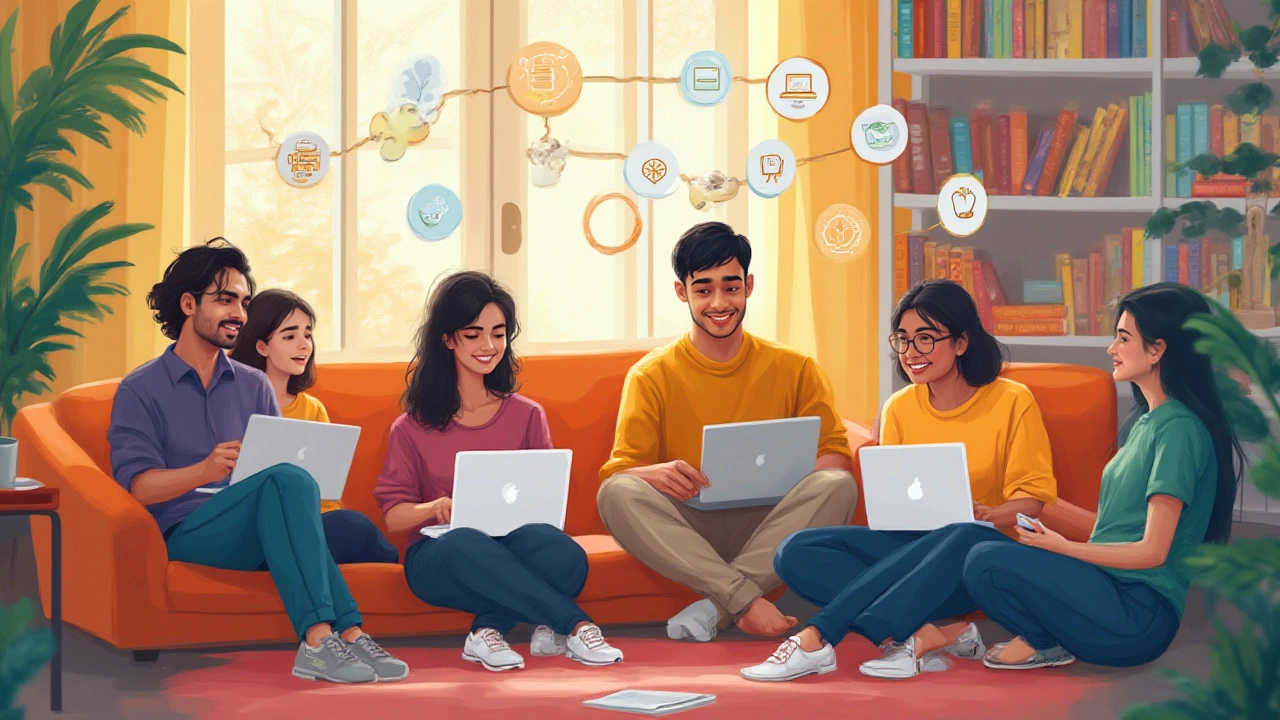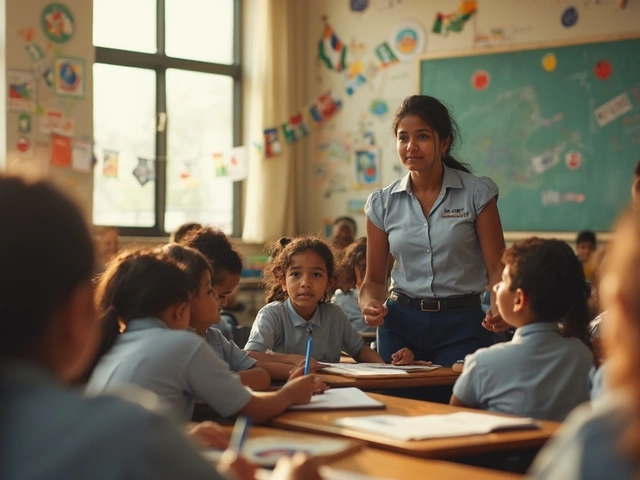
You spend hours scrolling online every day, but what if you could pick up a new skill just as easily as watching cat videos? Loads of people think mastering a skill online takes forever, or is only for “techies.” But here’s the thing—some digital skills are insanely easy to start, require next to no fancy equipment, and could make you money or just add some spark to your CV. The trick is knowing what to pick. Right now, in 2025, the world runs on screens, and the simplest online skills have the power to open doors, make life easier, or even launch a career from your bedroom.
What Makes a Skill ‘Easy’ to Learn Online?
Everyone wants quick wins. But when we say something is an “easy” skill to pick up online, what does that really mean? It’s more than just a trend. You want a skill you can actually learn fast—and use in real life. Low barriers are key. That means you don’t need a college degree, months of bootcamp, or expensive software to get started. Ok, but isn’t what’s easy for one person hard for someone else? Sure. But loads of surveys from digital learning platforms—like LinkedIn Learning and Coursera—keep ranking skills by how fast people master them on average. The easy ones have a lot in common: no complex theory, step-by-step resources, free or cheap apps, and results you can see almost immediately.
Take a look at how fast people are picking up tools like Canva or learning to type efficiently online. These aren’t coding languages or graduate-level statistics. Instead, they’re visual, interactive, almost playful to learn. Plus, lots of platforms make it painless to practice—YouTube tutorials, gamified lessons, or apps that let you experiment risk-free. Another overlooked factor: motivation. Things that feel useful show quick results, or have a creative kick, stick better. For example, learning to create simple social media graphics is way easier to stick with than abstract math formulas because you get instant feedback (and maybe even some likes on your next post).
The brain science backs this up. When you get small wins (like actually finishing a basic design or scheduling your first automated email), dopamine fires off. This makes these easy skills fun, almost addictive, and way less intimidating. That’s why, even in 2025, millions sign up each week for courses on skills like photo editing, note-taking strategies, or digital organization tools. The underlying theme? You can start at zero, and by the end of the day, have made something useful.
Quick checklist for an “easy” online skill:
- Free or affordable basic tools
- Tutorials for total beginners
- No deep technical knowledge needed
- Results you can show off fast (portfolio, social post, finished project)
- Can be learned in bite-sized chunks (think 15 minutes a day)
- Transferable: can help in school, work, or side hustles
If the skill checks most of those boxes, chances are it won’t stress you out or take months just to pick up the basics.
Top Easy Online Skills Anyone Can Pick Up (No Tech Degree Required)
So what actually lands on the “easiest” skills list right now? Forget trying to master Python in a weekend. Instead, think more about tools that help normal people every day—graphic design basics, digital marketing fundamentals, or social media management. And here’s the fun part: you can start most of these tonight, using just your phone or laptop.
Let’s kick off with graphic design on platforms like Canva. Why? No drawing skill required, drag-and-drop simplicity, hundreds of useful templates, and plenty of instant tutorials. You could literally make a social media post, resume, or party invitation before dinner. Canva boasts around 170 million users as of 2025, and their top tutorials get billions of views. That’s because the learning curve is gentle but the practical benefit is huge.
Typing efficiently and learning keyboard shortcuts is another shockingly underrated skill. Studies show people who master touch typing or basic “power user” shortcuts can boost their productivity by up to 40%. Plus, there are dozens of free typing games—like Keybr and TypingClub—that turn it into a fun daily habit instead of a boring chore.
Then there’s digital note-taking. Apps like Notion, Google Keep, or Evernote help you organize your life, whether you’re a student or small biz owner. They offer templates, video walk-throughs, and downloadable guides. Many users report they learned the basics in under a single afternoon, and now rely on these for everything from class notes to side project planning.
If you love social media, managing and scheduling posts is easier than you think. Tools like Buffer or Hootsuite let you set up auto-posts and track engagement without being glued to your screen 24/7. Most of these services provide five-minute “getting started” guides and free levels for personal accounts. In fact, social media management is one of the most in-demand freelance gigs that doesn’t require years of experience.
Basic photo editing—think cropping, filters, removing blemishes—comes alive with apps like Snapseed or Pixlr. It’s not Photoshop (which is way more complex), but it’s more than enough for blogs, school projects, or e-commerce sites. And the best part? Dozens of TikTok and YouTube creators share real-life editing workflow videos so you can copy their style step by step. Quick wins, zero jargon.
Let’s not skip the classic: learning a new language using apps like Duolingo or Memrise. It’s not just kids or language nerds—adults are the fastest-rising group. With gamification, streak bonuses, and instant feedback, you can say “hello” in ten new languages by the end of the week, even if you never become fluent. It’s the bite-sized lessons and community support that make sticking with it easy.
- Graphic design basics (Canva, Adobe Express)
- Touch typing and keyboard shortcuts (Keybr, TypingClub)
- Digital note-taking and organization (Notion, Google Keep, Evernote)
- Social media scheduling and analytics (Buffer, Hootsuite)
- Simple photo or video editing (Snapseed, CapCut, Pixlr)
- Language basics (Duolingo, Memrise, Babbel)
The best part? Mastering even one or two opens up freelance gigs, pads your resume, or just helps you crush your next personal project.

How to Start Learning Fast: Real Tips That Actually Work
Starting is where most people stall, even though the easiest skills demand almost no setup. The trick is making sure you don’t get distracted by endless tutorials or lost in a sea of apps. Here’s a playbook that actually gets you moving, even if you’re a total beginner.
Pick one exact thing, not ten at once. Want to try Canva? Focus on making a single Instagram post tonight. Trying Notion? Build a simple to-do list first. You’ll get more dopamine (and more skill) by finishing tiny projects than getting stuck in “research” mode. Science agrees—University of California studies show completion breeds motivation way more than starting does.
Keep your setup super simple. Don’t get hung up on equipment or premium accounts. Start free, use whatever phone or laptop you have, and only upgrade if you feel truly limited. Most platforms let you play with basic tools totally free, and only seasoned pros hit paywalls.
Ignore the “pro” tutorials for now. Lots of YouTube and TikTok creators tag videos as “beginner” but crank out 30-minute deep-dives. What you want is the shortest guide possible—five minutes or less—that shows you A to B, not A to Z. Once you finish a micro-project, then go look for more depth. Approaching learning in layers (quick win, then deeper) helps you avoid burnout and confusion.
Build a simple habit: 15 minutes a day beats two hours once a week. Experts call it “atomic habits”—a little bit daily wires the brain for long-term learning, even if it feels too easy at first. Set a calendar reminder or stick a note on your laptop. Suddenly, three weeks later, you realize you can whip up social posts, edit photos, or organize tasks almost by muscle memory.
Find community fast. This isn’t just pep talk—actual Facebook groups, Discord servers, or subreddit forums help beginners stick around. Post one thing you made. Ask for feedback. Celebrate hitting a streak. Tiny encouragements almost always turn into real momentum. Even apps like Duolingo email you monthly badges or streak awards to give you that “keep going” push.
- Set a micro-goal. Example: create one social post, schedule two tweets, edit one photo.
- Stick to free tools unless you outgrow them.
- Follow real beginners online—slide into their comment sections and ask what worked for them.
- Don’t chase huge goals. Stack tiny wins.
- Treat learning like a game, not homework.
- Celebrate every finished mini-project.
You’ll be blown away how easy skills go from “I’m not creative” to “I just made this” when you lower the pressure and focus on one step at a time.
Real-Life Success Stories: How These Skills Pay Off
This isn’t theory—it’s playing out every day. Let’s peek at folks who started the same place: zero experience, just a phone or laptop, hoping to learn something useful, fast.
Jane, a university student, picked up Canva during pandemic lockdowns. In her first week, she made posters for her student club. Those got noticed by a small business owner on campus, who asked her to help with their cafe’s Instagram. Fast forward, Jane now freelances alongside classes, pulling in about $400 a month from simple designs. The skill? Zero to billable in less than a month—all from free public tutorials and Canva’s built-in help guides.
Then there’s Adam, who never thought of himself as “techy.” He got tired of missing deadlines and notes for his job, so he tried Notion. Building a simple to-do list to track meetings and reminders boosted his work reputation—and confidence. He ended up training two coworkers to do the same, and now swears by Notion for everything from grocery lists to long-term projects. It wasn’t flashy, but it was a game-changer for daily stress.
Freelancers and side hustlers are cashing in too. Many small business owners admit they first found their social media managers on Fiverr or Upwork, hiring people mostly for their ability to quickly schedule posts and track comments with tools like Buffer—not for deep marketing theory. Speed, reliability, and basic know-how win out. Some top-rated freelancers on these platforms make north of $1000 a month only offering social posting and comment management—skills learned for free in weeks, not months.
Even teens are getting in on the act. TikTok’s own 2024 user survey showed that more than 65% of 16-20 year olds had “learned a completely new digital skill” from platform challenges, mostly involving video editing, photo tweaks, or basic content creation. A ton of these teens now run small channels or advise family on launching their first online business.
It’s not just about making money, either. Loads of people say that picking up these “easy” skills gave them a hit of confidence and opened their eyes to more complex things later. Mastering a single Canva template might lead to trying full-featured graphic software later. Automating social posts might make you want to learn email marketing automation next. It snowballs, and it starts simple.
The pattern is always the same: start tiny, show someone, get one piece of positive feedback, and keep building. The digital world now rewards curiosity and small wins—and there’s more free support than ever before.
You’ve got digital skills at your fingertips. The easiest one is the one you explore today, on your terms, with whatever device you’ve got. The internet is waiting—why not see how far a small step can take you?
More Articles

CBSE Abroad: Is the CBSE Syllabus Really Available Outside India?
Curious if the CBSE syllabus is offered outside India? Learn where Indian students abroad can continue their CBSE education, which countries host CBSE-accredited schools, and what makes these schools tick. Find tips for spotting genuine CBSE institutions and the upsides and challenges for expat students. Get straightforward info on how to keep your studies on track wherever you are.

Is 50 Too Late for an MBA? The Real Pros, Cons, and Surprises
Thinking about doing an MBA at 50? This article unpacks whether going back to school at this stage actually pays off. We dig into real experiences, practical benefits, and the tricky parts you might not expect. From battling age bias to discovering unexpected advantages, the reality is less simple than it looks. Find honest tips on choosing the right program and making the most of what you already know. If you've ever wondered if 50 is too late, this is what you actually need to hear.

Exploring What Fuels Extreme Competitiveness in Exams
Extreme competitiveness in exams often stems from a mix of personal ambition, societal pressures, and strategic planning. Understanding the core motivations, such as the desire for success or prestige, can provide insights into more effective exam preparation techniques. It's also crucial to maintain a balance to prevent burnout while achieving goals. This article delves into what makes one fiercely competitive during exams and offers practical tips for managing this drive productively.
